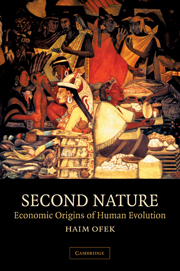1 - Introduction
Published online by Cambridge University Press: 06 July 2010
Summary
The propensity and capacity to exchange one thing for another between two traders – however unrelated to each other – is a profound distinguishing feature of human subsistence. Human beings are endowed with remarkable skills of trade which they deploy spontaneously when confronted with favorable opportunities; skills that lie dormant in the absence of such opportunities. As is true of other innate human abilities – such as the mastery of spoken language – basic skills of trade are taken for granted precisely because they are either inborn or acquired at a young age without conscious effort. Such skills are not as trivial as they may seem to a casual observer or, for that matter, to their very practitioners. Exchange requires certain levels of dexterity in communication, quantification, abstraction, and orientation in time and space – all of which depend (i.e., put selection pressure) on the lingual, mathematical, and even artistic faculties of the human mind. Moreover, exchange relies on mutual trust: predictable codes of conduct agreeable to the human sense of morality. Exchange, therefore, is a pervasive human predisposition with obvious evolutionary implications. The root cause of this predisposition and its evolutionary consequences in history, and prehistory, are the central concerns of this book.
Was exchange an early agent of human evolution, or is it a mere de novo artifact of modern civilization? The evolutionary literature treats the question with great caution. Many authors, starting with Charles Darwin and Alfred Russel Wallace, preferred to avoid the issue altogether. When the issue comes to the fore, the importance of exchange in recent industrialized societies is readily acknowledged.
- Type
- Chapter
- Information
- Second NatureEconomic Origins of Human Evolution, pp. 1 - 6Publisher: Cambridge University PressPrint publication year: 2001

